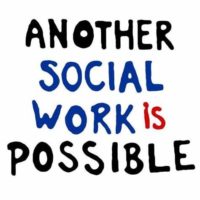You may have noticed that SWAN is using a variety of formats to debate government policies and the role of social work during the current pandemic. Thursday evenings have seen us co-host several huge international webinars with the IFSW, as well as national meetings that address the UK context. SWAN International (SWAN i) has grown exponentially as we connect with workers from South Africa, Hong Kong, Thailand and Greece to name but a few. The calendar is looking busy for months to come, as the appetite for transparency, critical debate and change grows further.
On the 7th May 2020, SWAN hosted a closed meeting for UK social workers that was designed to be a safe space for sharing the reality of what frontline practice is looking like during the COVID pandemic. SWAN recognised that detailed stories of experience are essential for understanding how our government is using the social work profession to deliver its ideological goals during this time of fear and change. We also recognise that practitioners often feel very wary of sharing their worries about what they are being asked to do or criticising their employer. Creating a safe space was crucial. We are very grateful that people trusted our forum to share perspectives, and much came from it.
Our focus was to explore experience, perhaps identify themes, and consider next steps. Immediately we all identified a desire for more meetings in a similar vein. Therefore we are going to be back on the 11th June, details to follow.
Some personal experiences were hard to hear. One worker spoke of entire teams having to reapply for their own jobs, as their employer took advantage of the union stepping back from a walk-out during the pandemic. Another shared that community groups and schools have led the way in easing the impact that COVID has had upon families already managing poverty, with their employer simply trailing in their wake, signposting families.
People talked of the way that families without a laptop or internet access simply can’t get the services they are entitled to. Those using services and reliant upon the welfare state have not been able to stockpile food; those with really complex needs such as drug users are being left behind as services withdraw. Redeployment of social workers may be a common consideration across local authorities but there are worrying stories of wholly inappropriate placements.
Several workers shared feelings of guilt as people feel forced to choose between their own safety and the needs of the people they are trying to support. Many stories highlighted that managers do not know how to respond to this crisis, are paranoid about serious case reviews highlighting failings, and are increasing control and reducing dialogue with workers as a result. Alongside this, the government clearly is using this period of shock to force its own agenda of privatisation and reducing regulation.
Throughout all of this, we remembered the workers who have died of COVID-19.
During discussion, themes emerged around the disconnect between social workers across the UK:
- Expectations of working conditions and our role are varying wildly from local authority to local authority, which is keeping us from coming together with one voice to protest. If we do not know what is happening a few miles away, how much harder it becomes to recognise that our own situation is not ok. There is no consistency of experience – its each local authority for themselves. Survival of the fittest.
- Our government will change legislation without consultation and will demand that we as social workers deliver their agenda. What are the main social work bodies doing to challenge the terrifying deregulation of social work services?
- There is a burning desire for better amongst workers. This does not simply mean better working conditions; this means better service for the families we are trying to support. If we can suddenly house those living on the streets and eradicate rough sleeping, then long term change really is possible. Flexible and responsive community-based action is saving lives and that’s where the future of social work needs to lie, if it is to offer anything beyond monitoring and the gatekeeping of limited resources. We want a new normal.
- There is a huge groundswell in political activism amongst many who were never agitated before. Senior figures in the medical and care profession are outspoken in their criticism of the government. There is a new public concept of what a skilled and essential worker is; of the role of migrant workers; of the importance of renationalised care services. SWAN must continue to build alliances and ensure social workers can get involved in political action.
These themes are informing a set of demands that we hope to pull together, potentially after the next Workers’ Experience meeting. Please consider joining this safe forum and telling us what working life is like for you, and the people you are working to support. Alternatively, email us your story at swansocialwork@gmail.com.


